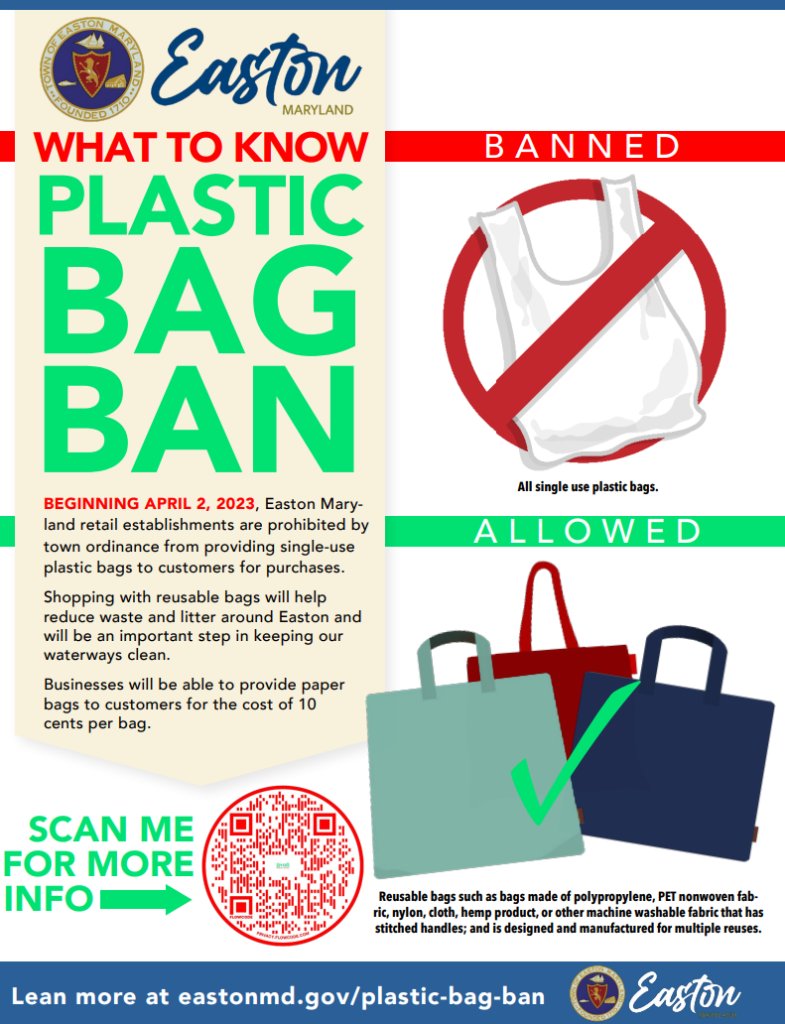
Please Follow us on Gab, Minds, Telegram, Rumble, Gettr, Truth Social, Twitter
It was bound to happen sooner or later. The small town of Oxford, with 611 residents and just a handful of stores, is considering a ban on one time use plastic bags. After all, their big brother eight miles away, Easton, did the same a couple of years ago, forcing stores there to charge 10 cents for paper bags. Customers who didn't want to pay that fee were forced to buy their own bags OR go without bags at all.
It seems that many jurisdictions across Maryland and the U.S. are implementing these bans.
The problem is the bag ban may be fairly useless in fighting pollution, and it is too big a burden on small stores as well as customers. That's not the only problem.
According to this story from FOX News, the bans actually make the problem of plastics in trash dumps worse, not better:
As the article says, consumers started using thicker multiple use grocery bags instead of the small, thin bags they used before and the thicker bags are NOT recyclable. Those bags are filling landforms and causing more waste than ever before. California is seeking to re-write the ban to solve that problem, but where they draw the line is a huge issue. For example, many stores, while banning single use plastic bags, still wrap other items like meat and vegetables in plastic film and have produce packaged in plastic bags.
In Washington state, the ban has done little to stop plastic bag pollution. A study done this year showed the weight of plastic in landfills there is virtually unchanged.
The Pros and Cons of plastic bag bans are examined in this article:
The Pros and Cons of Plastic Bag Bans | Dumpsters.com
Yet, in an effort to "support" the claims of environmental groups, these bans seem to be spreading. In Maryland, there are bans in Prince George's County, Baltimore County, Baltimore City, Frederick, Annapolis, and Easton to name a few. Most of the counties not only ban single use plastic bags, but they go on to force retailers to charge customers anywhere from 5 to 10 cents for a paper bag. That fee usually goes to either the store or the municipality, exposing the possibility that this is just an additional tax for local governments to add to their coffers.
This seems odd because we remember when paper bags were the issue as they were "killing trees." That problem seems to have miraculously gone away. This article discusses the move to ban single use paper bags:
Banning paper bags would help the planet, but more than half of Americans are against it | Trees.com
Is this a "no win" situation?
It seems the ban on single use plastic bags has other issues. First, in many jurisdictions there are exemptions such as: fresh flowers, dry cleaning, newspapers, baked goods, prescription drugs purchased at a pharmacy, and bulk items such as vegetables, nuts, seafood, and fruit.
Also, in one case an Annapolis alderman voted against the ban and the accompanying bag fee, stating that it was "inequitable" and would hurt those on public assistance the most. He wanted to exempt people on public assistance, but the city couldn't figure out a way to work with that.
So, what is a decent solution?
Certainly, single use plastic items in every form are under fire, whether it's packaging and service ware, such as bags, bottles, wrappers, and straws. Since 2000, single use plastic is part of almost everything we produce and use. For some, such as disabled people and the elderly, many of these items are critical in helping them live a normal life. They also cut cost to manufacturers which helps keep costs down for consumers.
According to the NDRC: Single-Use Plastics 101 (nrdc.org)
The most common types of plastic waste found in the environment are cigarette butts, followed by food wrappers, bottles and bottle caps, shopping bags, straws, and stirrers. And we’re only just beginning to see the widespread presence of small microplastics, which include things like threads that shed from synthetic clothing and the beads and glitter added to personal products.
The simple solution to the onslaught of plastic is to recycle more. However, it appears that items such as plastic bags and straws are too small and actually jam any recycling machinery currently is use. Therefore, they are deemed "unrecyclable."
Unless of course, someone finds a way to solve that problem. In a country of innovative people, is it plausible that NO ONE can invent a recycling machine that can handle these items?
The bag ban is just another in a long line of actions that look good in headlines and press releases, but actually do little to prevent pollution of our waterways or excessive trash in landfills. There are too many other things such as disposable diapers and cheap plastic items that contribute more. In fact, almost everything we use is made completely or partially of plastic that will eventually end up in landfills etc.
Don't tell the virtue signaling environmental crowd especially the politicians looking for votes and donations. They keep initiating these ridiculous laws and ordinances which allow them to look like environmentally conscious leaders who "care." They ignore other solutions that are much more reasonable and plausible for the everyday citizen. But without these big splashy bag bans, what will they brag about at their fundraisers and cocktail parties or at spin class?
To be truly helpful in cleaning up pollution, they might have to give up their water bottles, cell phones, clothing, etc. Wouldn't want them to sacrifice those things.
PLASTIC-BAG-BAN-FLYER (eastonmd.gov)
Prince George's County Council - Reference No. CB-032-2023 (legistar.com)